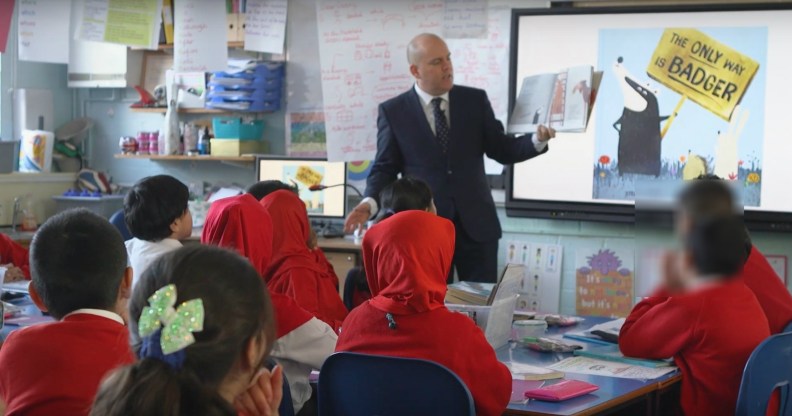Birmingham school protest: Giving children LGBT lessons could save lives

Andrew Moffat teaches LGBT-inclusive lessons at Parkfield Community School. (Varkey Foundation/YouTube)
Shabana Mahmood has faced criticism after questioning the “age appropriateness” of LGBT-inclusive relationship lessons “in the context of religious backgrounds,” highlighting the need for better representation in the classroom.
The Labour MP spoke in the House of Commons following protests at a primary school near to her Birmingham Ladywood constituency. She denied siding with the group of predominantly Muslim parents opposing the lessons, insisting that her issue was with families “not being engaged with by the school prior to the new curriculum being launched.”
Parkfield Community School had been teaching children as young as five about same-sex parents, a move which Stonewall has welcomed as “crucial.”
In a recent report, the charity found that almost half of LGBT+ schoolchildren are victims of homophobic or transphobic bullying. Three in five lesbian, gay or bisexual children self-harm, a number which rises to four in five when it comes to trans children. One in five children LGB children and two in five trans children have reported attempting suicide.
LGBT lessons are ‘crucial’
A Stonewall spokesperson told PinkNews: “A crucial part of tackling these challenges is equipping schools with the tools they need to fight bullying and deliver an LGBT-inclusive curriculum.
“We know from our research that the LGBT community is disproportionately affected by mental health problems. When bullying is not addressed, it can have a deeply damaging and long-last impact.”
Dr Kate Mason, a clinical children’s psychologist, says that creating a safe space for children to express themselves would have a positive effect on their mental health and well-being.
“Self-harm is rife in young people and often this comes about through not being able to show their true identity because of society,” she said.
“A crucial part of tackling these challenges is equipping schools with the tools they need to fight bullying and deliver an LGBT-inclusive curriculum.”
“By being inclusive, and through education at an age appropriate level, we can hopefully begin to be more accepting of diversity. This should encourage LGBT children to feel safe enough to speak out about their identities, which may help reduce acts like bullying, self-harm and even suicide.”
The issue is further complicated when it comes to Muslim and BAME families. According to Stonewall, 40 percent of LGBT youth say that they have somebody at home that they can talk to about their identity, a figure which drops to just 28 percent among children of colour.

Andrew Moffat teaches at Parkfield Community School in Birmingham. (Varkey Foundation Global Teacher Prize/YouTube)
Ezra Stripe is the diversity and inclusion officer for Hidayah, a national support group for LGBT Muslim people. They said that living in that intersection, “there is very much a feeling that you’re not in either camp.”
“The LGBT community can be very racist and Islamophobic, while the Muslim community by and large doesn’t accept LGBT people.”
LGBT lessons can bring positive visibility to Muslim communities
As part of Stripe’s work, they regularly visit schools and universities with large Muslim populations.
“I meet a lot of children who have been told that there are no LGBT Muslims. They’re surprised that we exist,” said Stripe.
“It means that a lot of them who might be feeling that they could be LGBT feel that they won’t be accepted, and don’t know who to turn to. In our membership we see a high rate of mental health struggles. I think a lot of that comes from a sense of isolation which can start at a very young age.”
They added: “There’s a lot of shame in this community about being LGBT. The sooner children are introduced to ideas like ours, the sooner they’ll be able to get away from the pain and isolation and find people they can relate to.”
While making schools more inclusive can help children who identify (or think they might identify) as LGBT, it can also help those whose parents are same-sex, trans or non-binary.
“I meet a lot of children who have been told that there are no LGBT Muslims. They’re surprised that we exist.”
— Ezra Stripe, diversity and inclusion officer at Hidayah
Karen Pollock, a therapist and Counselling Directory member who specialises in gender and sexuality diversity, said: “We know from decades of research that young people and children internalise ideas about being wrong or sinful with devastating consequences.
“It has a huge impact on LGBTQ+ children to be seen, and to see themselves and/or their families as welcome members of the community. When we have a book about a trans child in the reading corner, or make a card which shows two mummies we are saying to all children that difference is OK.”

